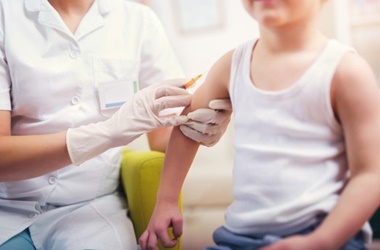More than half of GPs warn that vaccination rates are down on last year

Nearly 60% of GPs have found immunisation uptake to be down this year compared to last, according to a Pulse survey.
One in five (20%) of GPs said uptake was ‘much lower’ than a year before, while a further 38% said it had been ‘a bit lower’.
This comes despite NHS advice that childhood vaccinations should continue during the pandemic and as worrying statistics have been uncovered by researchers at the London School of Hygiene and Tropical Medicine.
Their study, highlighted in a new report from the BMA, found that in England the number of MMR vaccinations administered fell by 20% in the three weeks after social distancing measures were introduced on 23 March, when compared with the same point in 2019.
The rates had been marginally lower at the start of 2020 compared with 2019, but became far worse once lockdown was announced, according to the research paper.
Over the same three-week period, the study revealed hexavalent vaccine rates – including against diphtheria and tetanus – were around 7% lower compared with 2019, but this was in line with an ongoing decline and was not thought to be exacerbated by the pandemic.
By mid-April, uptake of both vaccinations had improved and although physical distancing measures remained, rates were higher at the end of April than in the same weeks in 2019.
There have been suggestions that parents have been choosing to avoid vaccinations – with a quarter saying they postponed their child’s appointment during lockdown.
In the Pulse survey of 395 GPs, 38% said immunisation activity had been ‘a bit lower’ than the same point in 2019, while 20% said vaccination uptake had been ‘much lower’ than a year before.
A total of 37% of GPs said vaccination rates were ‘about the same’, 4% said they were ‘a bit higher’ and 1% said ‘much higher’, found the survey, which was carried out in June.
It comes as a new report from the BMA has called for ‘a reversal of years of underfunding in general practice to ensure there is capacity to deliver vaccination services’.
The doctors’ union also called for ‘a payment system for general practice to be agreed in each UK nation that rewards practices for each vaccination delivered, while also incentivising high performance’.
BMA public health medicine committee chair Dr Peter English said: ‘It’s been incredibly worrying to watch the decline in vaccine rates in the UK over the past few years – for example, we lost our “measles-free” status in 2019 and the pandemic has of course meant even fewer vaccinations have been carried out as the NHS battled on all fronts to keep the virus at bay.’
Earlier this month, NICE published draft new GP vaccination indicators, which are to form a new QOF domain worth £40m and will replace the current childhood immunisation DES.
The Government also announced last week that all patients over the age of 50 will be eligible for flu vaccination this winter in what it is calling the ‘biggest flu vaccination programme in history’.
Dr English said: ‘As we recover from this pandemic, everything must be done to increase vaccine uptake – particularly as we head into flu season and vulnerable people are at greater risk of becoming ill.
‘This means not only making sure the public understands the importance of getting vaccinated, but also resourcing the health service with what it needs to deliver this; adequate funding for immunisation programmes, IT services, and encouraging staff to protect themselves too.’
Ministers expect 30 million people to get vaccinated against flu this year, up from 15 millionm last year. But there are concerns around availability of flu vaccine as the Department of Health and Social Care has said GPs should use their own vaccine supplies in the first instance.
Pulse voluntary donation scheme
Since the outbreak of this pandemic, Pulse has strived to support you, whether it be through our resources page, our ‘Clinical Crises’ series, holding policymakers to account with exclusives such as practices being supplied with faulty masks, or GPs being told to stop routine services in the hardest hit areas.
However, good journalism cannot be done on the cheap and, like the whole publishing industry, we have been affected by the economic slowdown. We also strongly believe the content we produce should remain free as we feel it is essential for you. Because of this, we have set up a voluntary donation scheme. There is no compulsion whatsoever to donate. But if you feel we are helping you, and you would like to support us, anything you can spare would be greatly appreciated. Read more here.
Pulse October survey
Take our July 2025 survey to potentially win £1.000 worth of tokens

Visit Pulse Reference for details on 140 symptoms, including easily searchable symptoms and categories, offering you a free platform to check symptoms and receive potential diagnoses during consultations.












